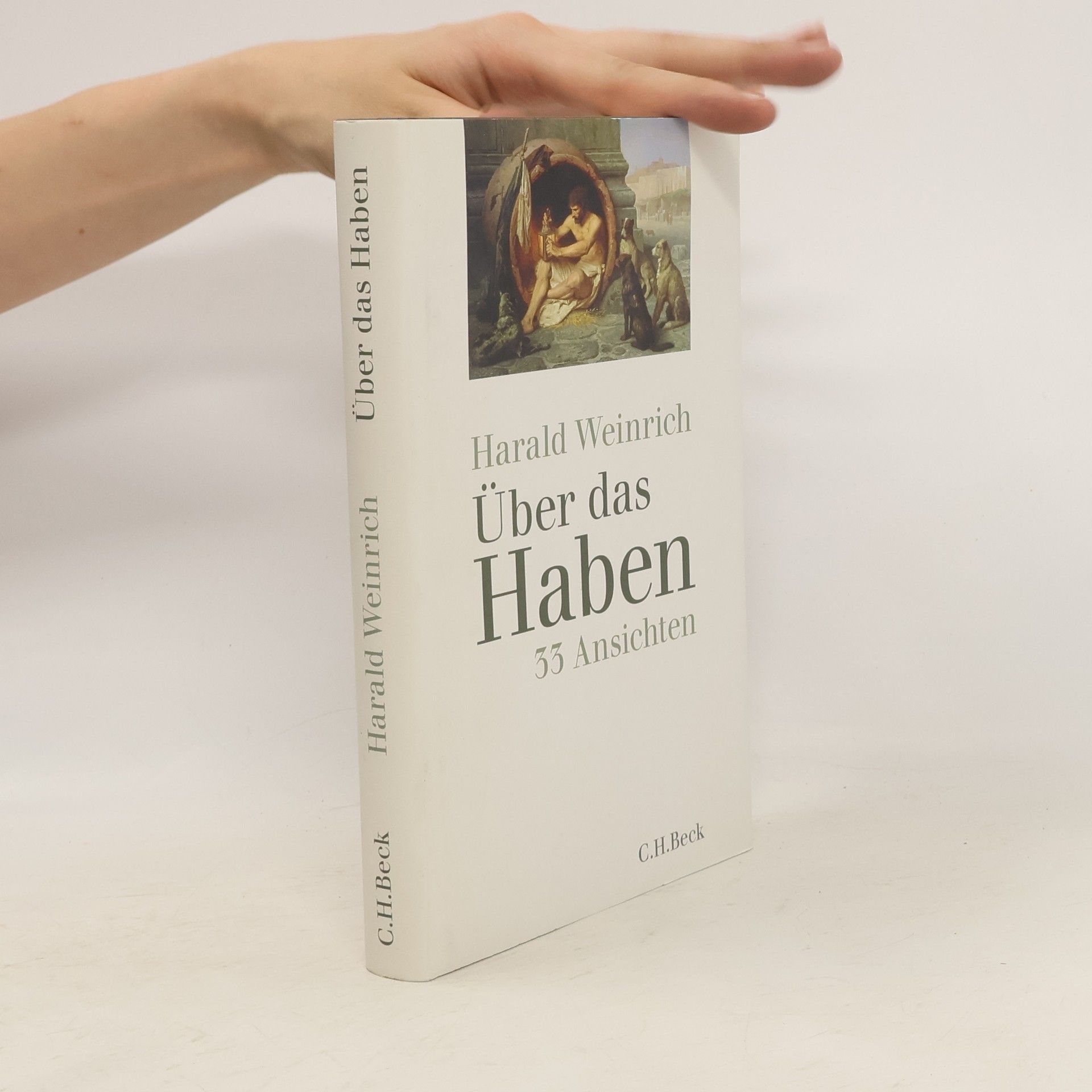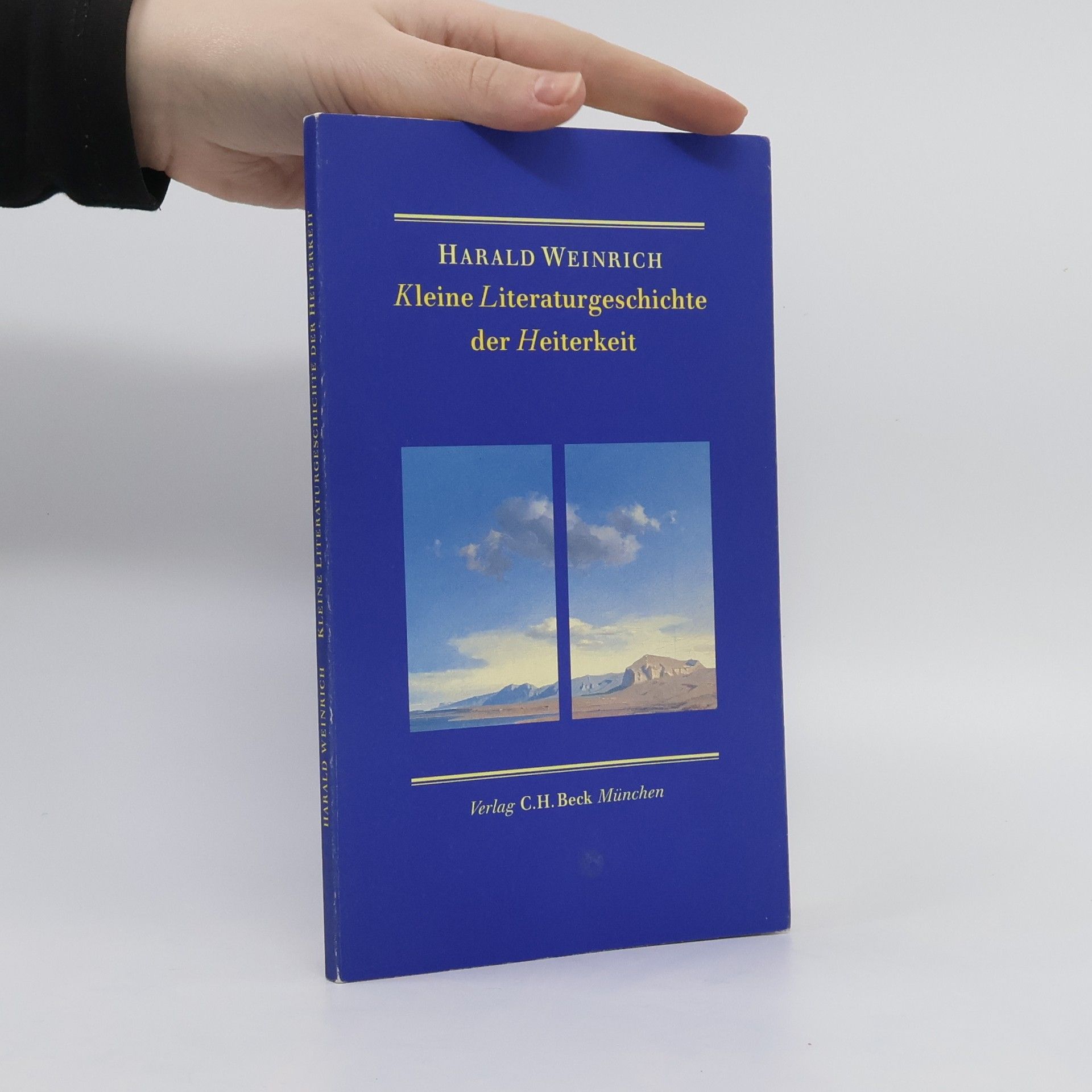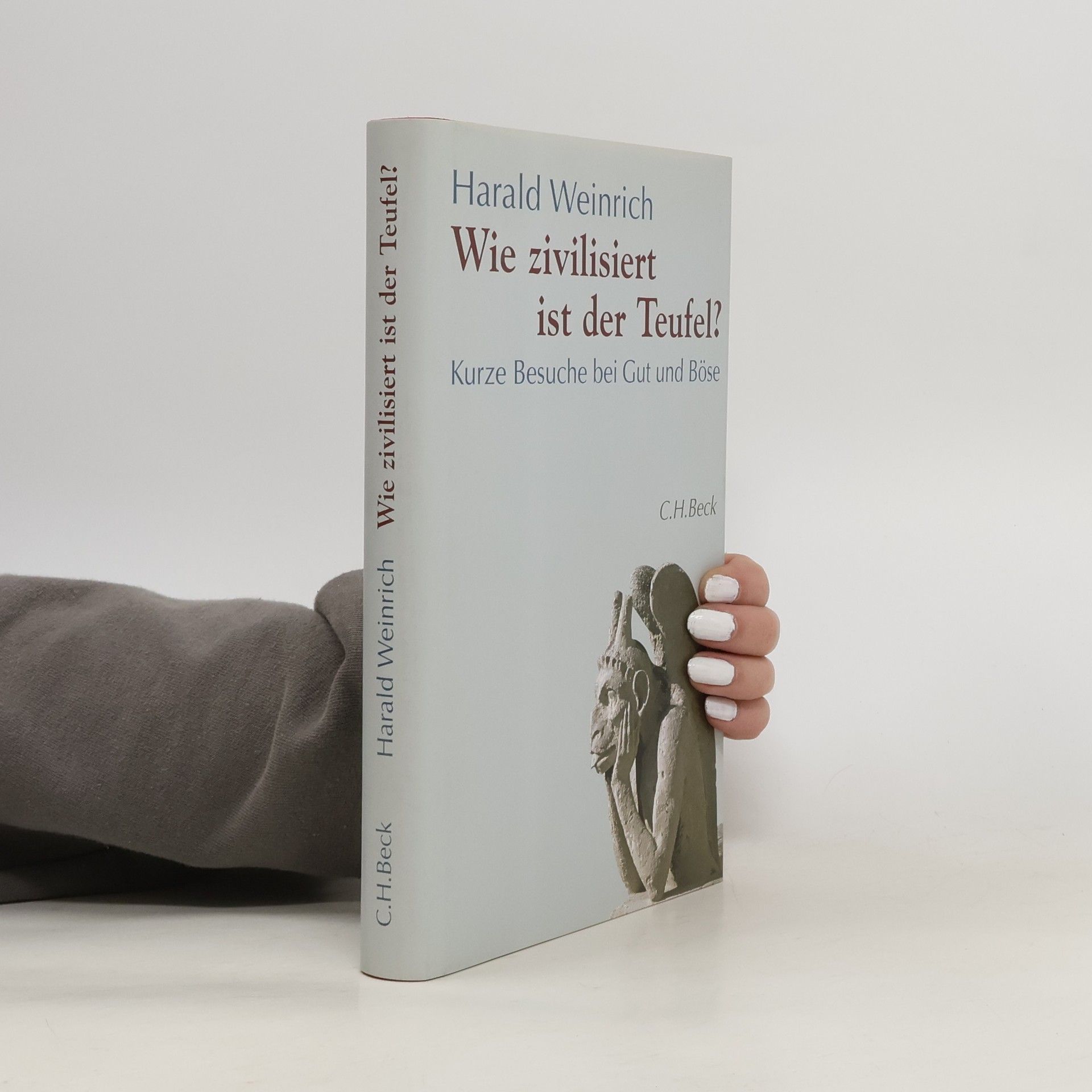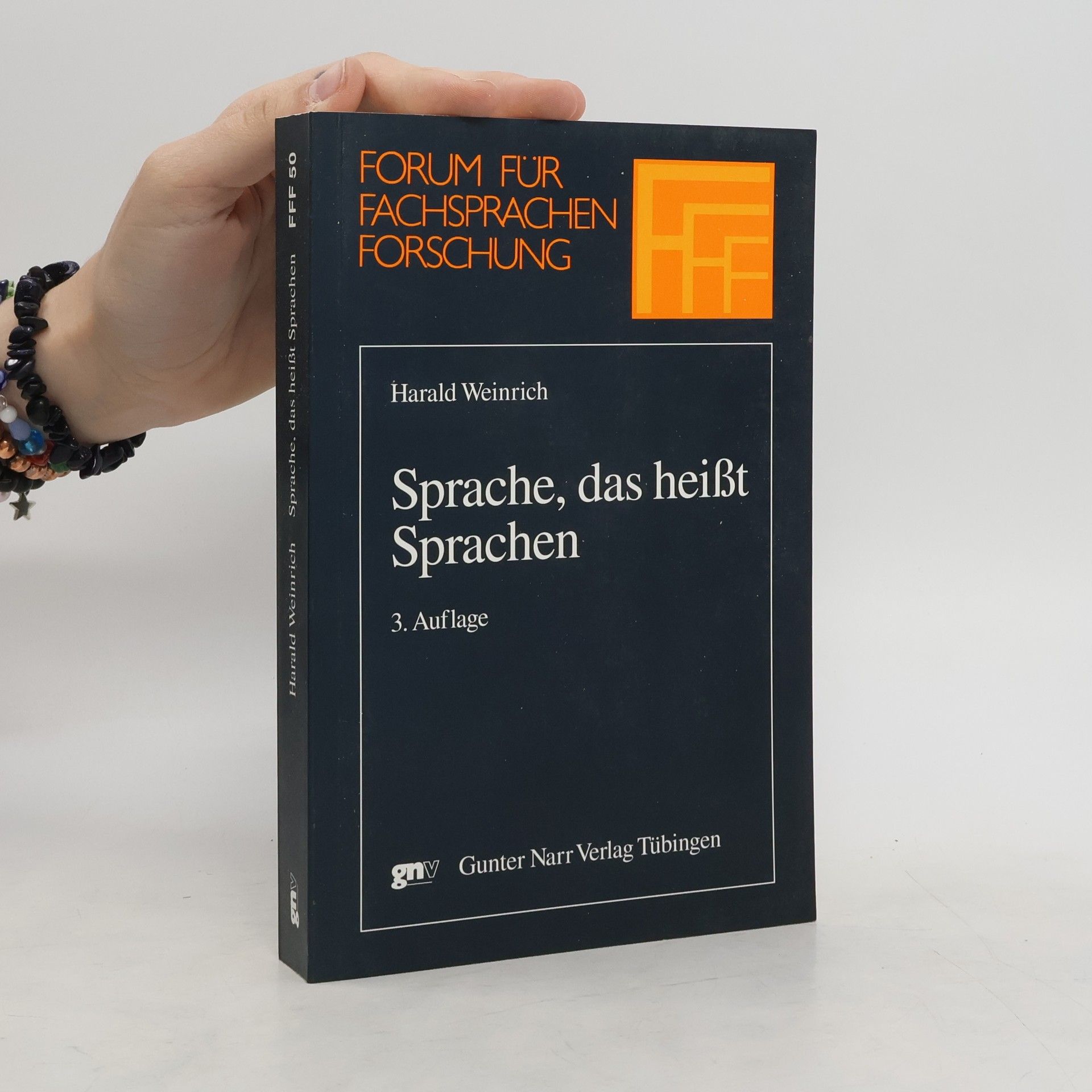Die anthropologische Linguistik von Harald Weinrich untersucht die Sprache im Kontext des Dialogs und betont die Rolle von Gedächtnis und Körper in der Kommunikation. Seine Forschung umfasst eine Vielzahl von Themen, von Textsorten bis hin zu Fachsprachen, und analysiert deren kulturelle Bedeutung sowie zukünftige Entwicklungen. Weinrich formuliert sprachpolitische Ideen, die bereits praktisch umgesetzt wurden. Die überarbeitete Neuauflage dieses zentralen Werkes bietet eine tiefgehende Auseinandersetzung mit der spezialisierten Kommunikation in der modernen Welt.
Harald Weinrich Book order (chronological)






Am Eingang dieses Buches begrüßt uns Diogenes von Sinope, der nichts haben will, nicht einmal von Alexander dem Großen. Er ist freilich die Ausnahme. Die meisten Menschen haben gern, und deshalb mangelt es auch nicht an Gründen und Anlässen, sich über das Haben zu äußern. In einer höchst unterhaltsamen Reise durch die Sinnwelten des Habens eröffnet Harald Weinrich, der Grandseigneur der europäischen Sprachwissenschaft, verblüffende Einsichten in unseren Gebrauch des Wörtchens Haben - und unser Haben-Denken, das sich darin offenbart. Von den philosophischen Kategorien des Aristoteles, von denen eine das Haben ist, bis zu Romeo und Julia, die nur noch sich selber haben, und Martin Luther King, der einen Traum hat, betrachtet Harald Weinrich in seinem neuen Buch den Umgang mit dem Wort Haben. Selbst der „Habenichts“ Hitler kommt darin zu Wort. Weinrichs Blick gilt aber nicht nur den Philosophen und Dichtern, den Tyrannen und Freiheitshelden. Auch das leidige Haben und Nicht-Haben, das Haben, das man nun einmal nicht besitzen kann, das höflichere Haben und der (andere) Umgang mit dem Haben in anderen Sprachen und Grammatiken finden in dieser kleinen Aufklärung über das Haben ihren eleganten Portraitisten.
Harald Weinrich, einer der großen Literatur- und Sprachwissenschaftler unserer Zeit, hat in seinen Werken viele Themenkreise berührt. „Tempus“, „Linguistik der Lüge“, „Lethe“, „Knappe Zeit“ – schon die Titel seiner berühmten Bücher legen Zeugnis davon ab, wie weit das Spektrum der Fragen reicht, denen der Autor in ihnen nachgeht. Die sinnliche Anschauung, geschärft durch den hermeneutisch geschulten Blick, ist dabei stets ein Kennzeichen seines Stils gewesen. Ist Goethes Mephistopheles, wie Madame de Staël gemeint hat, ein „zivilisierter Teufel“? Und wo verlaufen überhaupt die Grenzen von Gut und Böse im Spiegel der Literatur? Mit solchen und ähnlichen Fragen befaßt sich Harald Weinrich in den zwanzig kurzen Essays dieses Buches. In ihnen greift er weit aus in die Kulturgeschichte, in die Philosophie und Theologie und übergeht auch nicht, neben vielen hellen Erscheinungen, die dunkelsten Jahre der deutschen Geschichte. Immer bleibt jedoch seine Anschauungsbasis die europäische Literatur, betrachtet in einer nahen und dichten Lektüre ihrer großen Werk.
Sprache, das heißt Sprachen
- 420 pages
- 15 hours of reading
Wieder lieferbar: der „Klassiker“ von Harald Weinrich, mit einem bis 2005 aktualisierten und ergänzten Schriftenverzeichnis.
Knappe Zeit
Kunst und Ökonomie des befristeten Lebens
„Was tun angesichts der Kürze des Lebens? Zunächst Harald Weinrich lesen.“ Ludger Heidbrink, Die Zeit „Seine philosophischen Betrachtungen reichen vom berühmten Satz des um 400 v. Chr. lebenden Arztes Hippokrates (Kurz ist das Leben, lang ist die Kunst) bis zum Film Lola rennt aus dem Jahr 1998 von Tom Tykwer. Die Lektüre ... ist allen zu empfehlen, die sich dem komplexen Thema Zeit nähern.“ EM< Matthias Holdt, Das Parlament „Wie Weinrich die Literaturgeschichte von der Antike bis zur Gegenwart durchstreift, wie er in knappen Sätzen Philosophie- und sogar Uhrengeschichte treibt, gestützt durch sprachwissenschaftliche Fundamente, kurz: wie er eine allgemeine Kulturgeschichte des be-fristeten Lebens verfasst - das ist fabelhaft gemacht.“ Tom Heithoff, Der Tagesspiegel
Wenn es eine Gedächtniskunst gibt, sollte es dann nicht auch eine Kunst des Vergessens geben? Wieviel Vergessen braucht oder verträgt eine Kultur, und wann überschreitet die Vergeßlichkeit die Grenzen der Moral? Auf solche Fragen kann besser antworten, wer sich mit der Kulturgeschichte des Vergessens vertraut gemacht hat. Diese Geschichte legt Harald Weinrich hier vor - ebenso gelehrt wie stilistisch brillant, ebenso unterhaltend wie zum Nachdenken einladend.
Diese Grammatik überzeugt durch umfangreiche, kommentierte Beispieltexte, die die deutsche Sprache in ihrem aktuellen Zustand beschreiben. Mündlicher und schriftlicher Sprachgebrauch werden gleichwertig behandelt. Anstatt sich auf einzelne Wörter oder isolierte Sätze zu konzentrieren, bezieht sich die Textgrammatik auf größere Sinneinheiten, um Textstrukturen klar zu erkennen und zu verstehen. Diese Herangehensweise unterstützt die praktische Anwendung beim richtigen Reden und Schreiben in sinnvollen Zusammenhängen. Die Beispiele stammen aus verschiedenen Textsorten und repräsentieren die Vielfalt der deutschen Sprache, wobei kulturell bedeutende Äußerungen, insbesondere Klassiker, bevorzugt werden. Der Autor, emeritierter Professor für Deutsch als Fremdsprache in München und Honorarprofessor in Paris, hat an verschiedenen Universitäten gelehrt und zahlreiche Gastprofessuren innegehabt. Zu seinen wissenschaftlichen Veröffentlichungen zählen Werke zur Linguistik und Textgrammatik. Er ist Ehrendoktor mehrerer Universitäten und Mitglied verschiedener Akademien. Für seine Leistungen wurde er mit mehreren Preisen ausgezeichnet, darunter dem Sigmund-Freud-Preis und dem Konrad-Duden-Preis.
Litfass 41. Zeitschrift für Literatur.
- 160 pages
- 6 hours of reading



